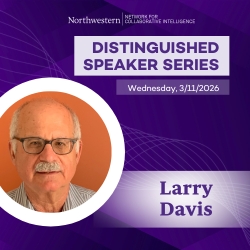Events
Past Event
ECE "Meet-the-Faculty" Seminar - Adrienne Kline
Department of Electrical and Computer Engineering (ECE)
2:00 PM
//
L440, Technological Institute
Details
Advances in machine learning (ML) offer unprecedented opportunities for transforming cardiac care, particularly using imaging data. This talk will explore the intersection of ML, health, and cardiac imaging, focusing on how novel methodologies can drive personalized care and improve clinical outcomes. We will discuss the translation of cutting-edge ML techniques, such as deep learning and transformers, into real-world healthcare systems, specifically in the detection and analysis of coronary anatomy. Additionally, the talk will highlight ongoing research into explainable models, adaptive learning algorithms, and the integration of ML into existing clinical workflows. By addressing challenges like data complexity and generalizability, this presentation will shed light on the path forward for developing AI-powered solutions that not only improve diagnosis and treatment planning but also continuously learn from clinical experience to enhance patient outcomes.
Time
Wednesday, October 9, 2024 at 2:00 PM - 3:00 PM
Location
L440, Technological Institute Map
Contact
Calendar
Department of Electrical and Computer Engineering (ECE)
"Fun with Fashion" - Larry Davis
Northwestern Network for Collaborative Intelligence (NNCI)
12:00 PM
Details

Join us for an in-person Distinguished Speaker event featuring Larry Davis, a leading figure in computer vision and artificial intelligence whose influential academic career and recent industry innovations at Amazon have helped shape modern approaches to visual understanding and generative media.
Title: "Fun with Fashion"
Abstract: More than 100,000,000 customers shop for clothing online at Amazon annually in the United States alone. The fashion catalogue is enormous and changes with high velocity as new styles are introduced and older items either go out of fashion or out of stock. Customers are challenged to find clothing that fits their style and their bodies at a price that fits their budgets. The Amazon Fashion science team addresses these challenges through the design and development of new machine learning and computer vision models that help customers navigate the catalog and efficiently evaluate items Amazon is recommending to them. The talk will discuss solutions the team has developed to problems including virtual try on (what will this garment look like on me?), complementary recommendations (how do I style this garment?) and size recommendations (what size, if any, of this garment will fit me?), emphasizing the challenges introduced by the need to have scalable solutions.
Lunch will be provided. Registration is required.
Larry Davis is a Senior Principal Scientist in Amazon’s Fashion and Fitness organization. He joined Amazon in 2018 after a long career in academics. At Amazon he worked on introducing novel customer experiences for fashion shopping like outfit builder (based on complementary recommendations) and virtual try on. He led Amazon’s first GenAI team for image and video synthesis, developing models to diversify the catalogue to make it more relatable for our customers. . He received his Ph. D. from the University of Maryland in 1975 and from 1977-1981 was an Assistant Professor of Computer Science at the University of Texas in Austin. He returned to the University of Maryland in 1981 and was the founding Director of the University’s Institute for Advanced Computer Studies (1985-1994). He also served as Chair of the Department of Computer Science from 2000-2012. Larry retired from the University in 2021 and is now a Professor Emeritus and a College Park Professor. He advised more than 75 Ph. D. students at Texas and Maryland. His work spanned many aspects of computer vision, including applications in visual navigation, robotic vision, media forensics, remote sensing,fashion and fundamental problems of object detection and activity recognition. He is a Fellow of both the IEEE and the ACM.
Time
Tuesday, May 12, 2026 at 12:00 PM - 1:30 PM
Location
Calendar
Northwestern Network for Collaborative Intelligence (NNCI)
